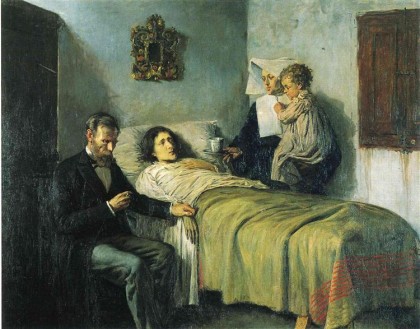Never Look Away: head and shoulders above the norm
Katie van Schaijik | Jul 22, 2019
If you google images of Florian Henckel von Donnersmark, you can find one of him absolutely towering over Angelina Jolie and Johnny Depp. It's part funny, part painful to see those celebrity icons cut down to size like that, accidentally and unavoidably, and even though the photographer obviously does his best to minimize the situation with tricks and angles.
On giant screens across the fruited plain, Johnny Depp has loomed large as romantic hero or or terrifying villain. But, in real life, if you're 5.10", you're going to look like a pipsqueak next to someone who's 6.9". It can't be helped.
It's just the same with Henckel von Donnersmark's two great movies: The Lives of Others and Never Look Away.

They're deeply thoughtful, intelligent, ruminative, compelling, and ambitiously, conscientiously composed in the service of the true good-for-man. You watch them and spontaneously you remember what art is—what it's meant to do and be. And you get a wave of surprise, gladness, and consolation to find that it's actually still a thing, still possible, still happening, even today. Hollywood pop looks small and pitiful in comparison.
The contrast is so embarrassing that you want to look away. You laugh, because you can't help it. But you feel sorry about it too. All the emptiness and manipulation, and the delusion, superficiality and self-importance, all the terrible not-understanding of what's really wanted and needed, what endures, who's important and why. It's sad. Also, it's hilarious, so you crack up. Then you watch those FHvD movies again, and you cry for the suffering in the poor world, and for the beauty in things. You seethe over the wrong and waste of evil ideologies and moral rot, and you quietly exult over the way imperfect individuals can triumph, and the way God's promises to humanity are always kept. They make you want to be good. They fortify your determination to live well, to resist the glamour of evil, the pressures of wrong, the mockery of the mob.
If you're like me, you might wish there wasn't quite so much sex and nudity in Never Look Away. There's an argument to be made that in a culture that has normalized pornography, it's good, even necessary, to show sex and nudity in the service of love and life. I get that, intellectually. But I still don't like it, personally, and I have doubts about its efficacy. Is it really possible to depict sex as the embodiment of authentic conjugal love with a camera, on a screen? Regardless, the very fact that there's an argument to be made about it is somehow enough for me. Those movies are all about big, probing questions and contentious issues. And about limited, imperfect human beings raising them, examining them closely, and working through them patiently, because that's the only way to arrive at truth, actually.
I wonder if all the blue is meant to be an homage to Picasso's blue period—that stage of his somewhere between his immature realism and his decadent abstraction.



It's nice to wonder things like that about a just-released movie.
